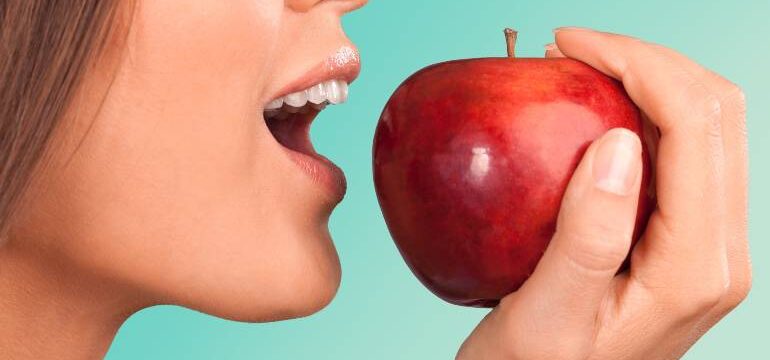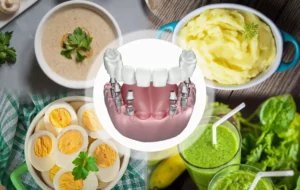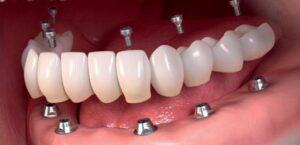
Undergoing All-on-4 dental implant surgery is a significant step towards restoring your oral health and regaining a confident smile.
After the dental implant procedure, proper care is essential to ensure a successful recovery. One crucial aspect of recovery is your diet.
Choosing the right foods can greatly influence your healing process, minimize discomfort, and support the integration of your new dental implants. In this article, we will explore the best All-on-4 dental implant diet for after surgery.
Immediately After Surgery
Immediately after dental implant surgery, it’s crucial to follow a soft food diet to ensure a smooth and comfortable recovery. For the first 24-48 hours, stick to cold liquids and avoid hot foods and drinks, as they can irritate the surgical site and delay healing.
Soft foods like yogurt, scrambled eggs, mashed potatoes, and cooked vegetables are excellent choices during this period. These foods are gentle on your mouth and provide essential nutrients without requiring extensive chewing.
It’s also important to avoid using straws or drinking through a straw, as the suction can dislodge the blood clot that forms at the surgical site, increasing the risk of a painful condition known as dry socket. By adhering to these guidelines, you can help ensure a smooth recovery and support the healing process of your dental implants.
The Initial Days After Dental Implant Surgery: Soft and Nutrient-Rich Foods
During the immediate post-surgery period, it’s essential to follow a modified diet to ensure the best possible healing for your dental implants. Knowing what to eat after dental implant surgery is crucial to facilitate healing and avoid putting strain on the delicate implant area.
This often involves consuming soft and nutrient-rich foods that minimize strain on the surgical site and support the integration of the implants. Solid foods that are hard or require extensive chewing should be avoided during this stage to prevent any damage or disruption to the healing process.
In the immediate aftermath of All-on-4 surgery, your mouth will be sensitive and require gentle care. During the first 2 weeks, focus on consuming soft, nutrient-rich foods that don’t require intense chewing or create additional pressure on your dental implants. Here are some excellent options:
- Smoothies and Protein Shakes: Packed with vitamins and minerals, smoothies and protein shakes are a great way to nourish your body. Use ingredients like yogurt, milk, fruits, vegetables, and even a scoop of protein powder to ensure you’re getting the nutrients you need.
- Mashed Potatoes: Creamy mashed potatoes are easy on your mouth and provide carbohydrates for energy.
- Soup: Warm, soothing soups like chicken broth, vegetable soup, or pureed soups can be both comforting and nutritious.
- Greek Yogurt: High in protein and probiotics, Greek yogurt can aid in digestion and promote healing.
- Applesauce: A gentle way to include fruit in your diet without straining your mouth.
Nutrition and Healing
A healthy diet plays a pivotal role in the healing process after dental implant surgery. Consuming nutritious foods rich in protein, vitamins, and minerals can significantly aid in your recovery. Protein is particularly essential for the healing of gums and the integration of the implant into the jaw bone. Incorporate lean protein sources such as chicken, turkey, pork, seafood, and nuts into your diet to support tissue regeneration.
In addition to protein, whole grains, fruits, and vegetables are packed with fiber, vitamins, and minerals that are vital for the healing process. These foods not only provide the necessary nutrients but also help maintain overall health. However, it’s important to avoid sugary foods, hot and spicy foods, crunchy foods, and sticky foods, as they can irritate the gums and potentially delay healing. By focusing on a balanced and nutritious diet, you can enhance your recovery and ensure the success of your dental implants.
Gradual Transition to Solid Foods
After two weeks, as your mouth begins to heal and the swelling subsides, you can gradually introduce softer solid foods. Make sure to avoid any foods that are too hard or require excessive chewing. It is important to avoid chewy foods during the initial days post-surgery to ensure optimal recovery and stability of the implants.
- Scrambled Eggs: Soft, fluffy scrambled eggs are a good source of protein.
- Cottage Cheese: Another protein-rich option that’s easy to eat.
- Oatmeal: Warm and comforting, oatmeal provides both fiber and energy.
- Steamed Vegetables: Softly steamed vegetables like carrots, zucchini, and spinach are nutrient-packed and easy to chew.
- Fish: Tender, flaky fish such as salmon or tilapia can provide essential omega-3 fatty acids.
- Pasta: Soft-cooked pasta, whether it’s spaghetti, macaroni, or another variety, can be a gentle way to incorporate carbohydrates into your diet.
- Soft Fruits: Soft fruits like bananas, ripe peaches, and melons can provide natural sweetness and important vitamins without putting excessive pressure on your implants.
- Peanut Butter and Jelly Sandwich: A soft sandwich made with whole-grain bread and a thin layer of peanut butter and jelly can provide a satisfying and protein-rich meal.
- Hot Dogs: While it might sound surprising, a well-cooked hot dog with a soft bun can be a manageable option. Just ensure that it’s cut into small, bite-sized pieces and that you avoid any hard or crunchy toppings.
Remember: Caution and Moderation
As you introduce these foods, it’s important to approach your meals with caution and moderation.
Pay attention to how your mouth feels and how your dental implants respond to different textures. If you experience any discomfort or notice undue pressure on your implants, consider cutting your food into smaller pieces or opting for softer alternatives.
Chewing Techniques
While incorporating these new foods, it’s also a good opportunity to focus on your chewing technique.
Chewing with both sides of your mouth and taking smaller bites can help distribute pressure evenly and reduce strain on your dental implants.
Consult Your Dental Professional
Before making significant changes to your All-on-4 dental implant diet or returning to your regular eating habits, it’s essential to consult with your dental professional.
They can evaluate the healing progress of your dental implants and provide personalized recommendations based on your unique situation.
So, How long after All on 4 Dental Implant Surgery can I eat normally?
You can start transitioning to a more normal diet after about 2-3 months, but complete adjustment to regular eating can take up to 4-6 months for optimal healing. Follow your dentist’s advice for a successful outcome.
Foods to Avoid
While you’re on the path to recovery from All-on-4 dental implant surgery, it’s essential to avoid certain foods that could potentially damage your implants or hinder the healing process. Addressing missing teeth is crucial for restoring both functionality and aesthetics, and avoiding specific foods is important to protect your implants.
Here’s a more comprehensive list of foods to steer clear of during this critical phase:
- Hard Meats: Avoid consuming tough meats like chicken and steak, as their chewiness can place undue pressure on your dental implants.
- Hard Breads: Hard breads like bagels and crusty rolls should be avoided due to their density and potential to create strain on your implants.
- Crunchy Foods: Foods with a hard and crunchy texture, such as chips, pretzels, and raw vegetables, can put excessive pressure on your implants and should be avoided.
- Sticky Foods: Stay away from sticky foods like caramel, taffy, and chewy candies that can get lodged around your dental implants and cause discomfort.
- Hard Candies: Hard candies can break or chip your dental implants if bitten into, so it’s best to avoid them altogether.
- Nuts and Seeds: These small, hard particles can be problematic for dental implants and should be avoided, at least during the initial healing period.
- Spicy and Acidic Foods: Spices and acidic foods can irritate the surgical site, potentially slowing down the healing process.
- Tough Vegetables: Vegetables that are hard and require significant chewing, like raw carrots and celery, should be avoided until your dental professional gives you the go-ahead.
Taking Care for Long-Term Success
While some of these foods might become permissible as your implants fully heal and integrate, it’s important to approach them with caution, even in the long term.
Dental implants are durable but not indestructible, so maintaining a mindful approach to your eating habits can help ensure their longevity.
Remember that your dental professional is your best resource for personalized advice. Consult them for guidance on when and how you can gradually reintroduce certain foods into your diet. Following their recommendations will help you strike the right balance between enjoying a wide variety of foods and safeguarding the health and stability of your dental implants.
Want to know if food will get caught under your All on 4 implants?
Hydration and Nutritional Support
Staying hydrated is crucial for a smooth recovery. Make sure to drink plenty of water throughout the day. Maintaining good oral hygiene for both natural teeth and dental implants is also important. In addition to your diet, consider incorporating these nutrients that can support healing:
- Vitamin C: Found in fruits like oranges and strawberries, vitamin C is essential for tissue repair.
- Protein: Protein-rich foods aid in tissue regeneration and overall recovery.
- Calcium and Vitamin D: These nutrients are vital for bone health and can support the integration of your dental implants.
Managing Common Issues
After dental implant surgery, you may encounter some common issues such as constipation, pain, and swelling. To manage constipation, it’s beneficial to include high-fiber foods in your diet, such as whole grains, fruits, and vegetables. These foods help promote regular bowel movements and prevent discomfort. On the other hand, it’s wise to avoid dairy products and processed foods, as they can exacerbate constipation.
For pain management, follow your dentist’s instructions regarding pain medication. Additionally, using a cold compress can help reduce swelling and provide relief. Applying the cold compress to the affected area for short intervals can minimize inflammation and make the recovery process more comfortable. By addressing these common issues proactively, you can ensure a smoother and more comfortable recovery.
Maintaining Good Oral Hygiene
Maintaining good oral hygiene is essential for the longevity of your dental implants. Start by brushing your teeth gently with a soft-bristled toothbrush and fluoride toothpaste. This helps remove plaque and food particles without causing irritation to the surgical site. Flossing daily is also crucial to keep the areas between your teeth and around your dental implants clean.
Consider using an oral irrigator or “water flosser” to effectively clean between teeth and around dental implants. This tool can help remove debris and reduce the risk of infection. Regular dental check-ups are equally important to monitor the health of your dental implants and ensure their long-term success. By following these oral hygiene practices, you can protect your investment and enjoy a healthy, confident smile for years to come.
Conclusion
Choosing the right foods after All-on-4 dental implant surgery can significantly impact your recovery journey.
Your All-on-4 dental implant diet should opt for soft, nutrient-rich options during the initial days, gradually transitioning to soft solids as your mouth heals. Remember to avoid hard, sticky, and spicy foods to protect your dental implants.
Prioritize hydration and consider including foods rich in vitamins C, D, and calcium to support healing and bone health.
By following a thoughtful and nutritious diet, you’ll be well on your way to a speedy recovery and a confident smile. Always consult with your dentist or oral surgeon for personalized dietary recommendations based on your specific needs and circumstances.



